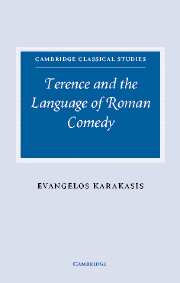Book contents
- Frontmatter
- Contents
- Acknowledgements
- Conspectus siglorum
- Introduction
- Part I Linguistic differentiation in Terence
- Part II Linguistic and stylistic unity in Roman comedy
- Introduction
- 8 Terence, Plautus and the palliata
- 9 Terence, Plautus and the togata
- 10 Terence, Plautus and the atellana
- Bibliography
- Index locorum
- Index nominum et rerum
Introduction
Published online by Cambridge University Press: 22 September 2009
- Frontmatter
- Contents
- Acknowledgements
- Conspectus siglorum
- Introduction
- Part I Linguistic differentiation in Terence
- Part II Linguistic and stylistic unity in Roman comedy
- Introduction
- 8 Terence, Plautus and the palliata
- 9 Terence, Plautus and the togata
- 10 Terence, Plautus and the atellana
- Bibliography
- Index locorum
- Index nominum et rerum
Summary
Introduction
The purpose of part II is to investigate the language of the comoedia palliata, togata and atellana in order to uncover any possible linguistic or stylistic relations between them. The ultimate aim is to establish that a certain unity in Roman comedy exists, from which Terence, the main object of this book, stands out, with the exception of his more traditional play Eunuchus and those scenes of his other plays in which he differentiates himself from his Greek model (last scene of Heautontimoroumenos, the Sannio scene in Adelphoe, the advocati scene in Phormio). In these he is apparently reworking his material in a more traditional way.
Part II constitutes the first complete comparative analysis of the language of Roman comedy. Some initial steps in this direction were taken by Wright, whose study was based mainly on stylistic features rather than purely linguistic ones. His is the only work examining the totality of the palliata; there exist also a certain number of smaller studies, exploring the language and style of individual authors without offering an overall comparative approach (references and criticism will be found in the introduction to each chapter below). Although some of Wright's final conclusions agree with the results of my investigation, they have several shortcomings. First, the data he examines are very limited, insufficient for any valid conclusions.
- Type
- Chapter
- Information
- Terence and the Language of Roman Comedy , pp. 145 - 149Publisher: Cambridge University PressPrint publication year: 2005

